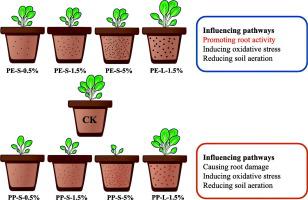Applied Soil Ecology ( IF 4.8 ) Pub Date : 2022-04-21 , DOI: 10.1016/j.apsoil.2022.104505 Yufei Yu 1 , Jia Li 1 , Yang Song 2 , Zhengyan Zhang 1 , Songguo Yu 1 , Meiling Xu 1 , Yangyang Zhao 1

|
As an exogenous pollutant, microplastics in soils may affect plant performance. In this study, pot experiments were conducted to evaluate the effects of various concentrations of polyethylene (PE) and polypropylene (PP) with different particle sizes on pak choi (Brassica rapa L. ssp. chinensis) growth. Morphological and physiological indicators of pak choi, and soil properties were measured. The toxic effects of microplastics on pak choi growth varied among the plastic type, concentration, and particle size. The effect of PE on pak choi fresh weight was negligible. However, the inhibition rate of 5% (w/w) PE on the total protein (TP) content reached 84.6% (p < 0.01). PP microplastics, especially those with small particle sizes, significantly reduced the fresh weight, leaf number, and TP content of pak choi. PE and PP had no significant impacts on the photosynthetic pigments in pak choi leaves. Pak choi root activity decreased by 6.7%–14.4% after exposure to PP, suggesting mechanical damage may have occurred. Conversely, Pak choi root activity increased by 13.5%–85.5% after exposure to PE. This may improve pak choi growth, thereby counteracting the negative effects of PE exposure. The activities of superoxide dismutase and peroxidase were lower after exposure to PP with a small particle size than the control. A plausible explanation is that the production of reactive oxygen species under PP stress exceeds pak choi tolerance, thereby inhibiting the expression of antioxidant enzymes. In contrast, pak choi resisted the oxidative stress caused by 5% (w/w) PE by improving the activities of antioxidant enzymes. Furthermore, PP and PE may indirectly inhibit the growth of pak choi by reducing soil aeration. These findings provide basic information for evaluating the phytotoxicity of microplastics in soil-vegetable systems.
中文翻译:

刺激与抑制:微塑料对小白菜生长的影响
作为一种外源性污染物,土壤中的微塑料可能会影响植物的生产性能。在这项研究中,通过盆栽试验来评估不同粒径的聚乙烯 (PE) 和聚丙烯 (PP) 浓度对小白菜 ( Brassica rapa L. ssp. chinensis ) 生长的影响。测量了小白菜的形态和生理指标,以及土壤性质。微塑料对小白菜生长的毒性影响因塑料类型、浓度和颗粒大小而异。PE对白菜鲜重的影响可以忽略不计。而5%( w /w)PE对总蛋白(TP)含量的抑制率达到84.6%( p < 0.01)。PP微塑料,尤其是小粒径的PP微塑料,显着降低了小白菜的鲜重、叶数和TP含量。PE和PP对小白菜叶片的光合色素没有显着影响。暴露于 PP 后,白菜根活性降低了 6.7%–14.4%,表明可能发生了机械损伤。相反,白菜根活性在暴露于 PE 后增加了 13.5%–85.5%。这可能会改善小白菜的生长,从而抵消 PE 暴露的负面影响。小粒径PP暴露后超氧化物歧化酶和过氧化物酶的活性低于对照。一个合理的解释是,PP 胁迫下活性氧的产生超过了白菜耐受性,从而抑制了抗氧化酶的表达。相比之下,w /w) PE 通过提高抗氧化酶的活性。此外,PP 和 PE 可通过减少土壤通气性间接抑制小白菜的生长。这些发现为评估土壤-蔬菜系统中微塑料的植物毒性提供了基本信息。











































 京公网安备 11010802027423号
京公网安备 11010802027423号